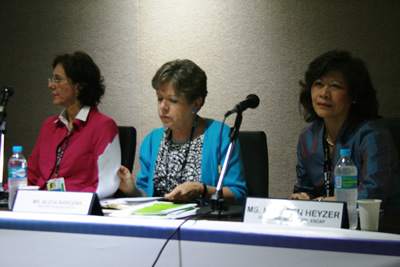ECLAC Proposes Structural Change with Equality and Environmental Sustainability at Its Heart
The aim is to transform and diversify the export pattern beyond raw materials and increase investment in knowledge-intensive sectors, according to the ECLAC Executive Secretary, Alicia Bárcena.

(21 June 2012) According to Alicia Bárcena, Executive Secretary of the Economic Commission for Latin America and the Caribbean (ECLAC), speaking today at a side event to the Rio+20 United Nations Conference on Sustainable Development: "The region needs to enter a third industrial revolution to overcome inequality that goes beyond poverty. Industrial policies, a macroeconomy in tune with industrialization efforts based on environmental sustainability and social protection and labour market policies are all crucial here".
She added that "Integrating the economic, social and environmental pillars of sustainable development has been recognized, including by the Earth Summit in Rio in 1992, as a fundamental factor in achieving a balanced development agenda. However, applying the concept in practice has proved to be a challenge".
Bárcena took part in the event called Green Growth and Sustainable Development: Regional Perspectives, organized by the five Regional Economic Commissions of the United Nations, where participants analysed challenges and opportunities in terms of effectively applying an integrated sustainable development approach.
The special guests were the President of Indonesia, Susilo Bambang Yudhoyono, Prime Minister of Lebanon, Najib Mikati, Deputy Prime Minister of Moldova, Mihai Moldovanu, and the Minister for the Environment, Energy and Telecommunications of Costa Rica, René Castro, who shared their visions of the opportunities and challenges of integrating the three development dimensions from the perspective of their countries.
René Castro referred to his country's decision to use the sustainable management of biodiversity and landscapes as an additional income stream and a partnership with Asia-Pacific countries such as Indonesia, in order to boost the management of natural renewable resources. At the same time, he recognized that there are challenges such as water sanitation and the urgent need to speed up the training of professionals who can grasp the opportunities offered by the paradigm shift (particularly in the sphere of engineering).
The Executive Secretaries of the Economic Commissions for Africa (ECA), Latin America and the Caribbean (ECLAC), Western Asia (ESCWA), Asia and the Pacific (ESCAP) and Europe (ECE) presented examples of good practices in the implementation of public policies and programmes that have successfully promoted an integrated approach to sustainable development at the regional level.
The Executive Secretaries emphasized the importance of the regional dimension as a fundamental link in coming up with an effective and coordinated response to cross-border economic, social and environmental problems.
Alicia Bárcena stated that "integrating the economic, social and environmental pillars of sustainable development involves implementing coordinated and complementary actions in the various sectors that will lead to economic growth and the achievement of social objectives - without endangering the limited resources of the planet".
Latin America and the Caribbean has abundant natural resources that include, according to ECLAC figures, a third of the world's water resources, 12% of farmable land, 13% of world petroleum production, 49% of international silver reserves and 48% of worldwide soya production.
According to the ECLAC Executive Secretary, despite the natural resources, macroeconomic stability and successful exports of raw materials, Latin America has not yet translated these advantages into more equitable and sustainable development.
Bárcena mentioned the importance of continuing to improve the governance of natural resources. Governance means the appropriation and distribution of the growing yields from the exploitation of these resources, so as to maximize their contribution to innovation, structural change, social protection and the minimization of negative externalities.
She added that the mechanisms and strategies for achieving this require public policy that includes regulatory and fiscal reform, as well as strategic planning and management and handling of environmental conflicts.
Bárcena stressed that the region needs to turn away from economies that are overly dependent on commodity exports and ensure the creation of policies that invest in growth, infrastructure and technology. She also highlighted the risk of reprimarization based on the concentration of commodity exports.
During the Rio+20 Conference, the ECLAC Executive Secretary has taken part in a series of activities including the presentation of the report Sustainable Development 20 Years on from the Earth Summit, a side event organized by the environmental think tank World Resources Institute (WRI) based in Washington D.C., and the launch of a joint document published with, inter alia, the Brazilian Institute for Applied Economic Research (IPEA).
For more information, click on this link.
Any queries should be sent to the ECLAC Public Information and Web Services Section.
E-mail: prensa@cepal.org; Telephone: (56 2) 210 2040.
Country(ies)
- Latin America and the Caribbean
Contact
Public Information Unit
- prensa@cepal.org
- (56 2) 2210 2040